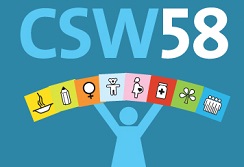CSW58: Implementing the MDGs
Sr. Meg Gallagher, MM attended the 58th Session on the Commission on the Status of Women (CSW), held in March at UN headquarters in New York; its priority theme was “Challenges and achievements in the implementation of the Millennium Development Goals [MDGs] for women and girls.” Following are excerpts from her report.
Sr. Meg Gallagher, MM, who served as a missioner primarily in Asia for decades, attended the 58th Session on the Commission on the Status of Women (CSW), held in March at UN headquarters in New York; its priority theme was “Challenges and achievements in the implementation of the Millennium Development Goals [MDGs] for women and girls.” Following are excerpts from her report, published in the May-June 2014 NewsNotes.
Approximately 6,000 people, representatives of Member States, UN entities, and NGOs accredited with the UN’s Economic and Social Council (ECOSOC) from all regions of the world, attended this year’s session and 350 side events As always at these international events, an atmosphere of joy – renewing friendships, sharing hope for a world we want – is the spirit that radiates in and among the participants.
Reports were given, in turn, by each UN region.
The European Union addressed the important issue of participatory governance and the role of civil society in empowering women in moving forward the MDGs. Bringing civil society actors into the consultation process adds an important dimension that is too often absent even when stakeholders from other sectors are actively engaged. Civil society organizations provide one of the more formal channels for ensuring community concerns are heard and addressed.
The Asia Pacific delegation spoke of the culturally and economically diverse region which carries within it many different expressions of needs. The goal of one of the member organizations is to create sustainable region-wide social change by establishing a strong alliance among organizations that work for the betterment of the status of women and girls in Asia.
The African delegation spoke of the challenges present in the country of Liberia, and the actions taken for improving the lives of women and children. A 14-year long civil war has devastated the lives of thousands, especially those who are poor. Effective remedies have been: promotion of community education and awareness; advocacy for policy reforms in health and education; establishment and support of training schools and facilities in rural areas to create community health providers; and promotion of opportunities in the Science-Technology-Engineering-Mathematics fields for young girls.
The Latin American delegation has worked tirelessly for political participation in national parliaments; they proudly spoke of their victory when 33 women were elected to the National Congress in Honduras in November 2013.
Ms. Lakshmi Puri, UN Women Deputy Executive Director, addressed the burning issue of trafficking in human beings. Trafficking, as we know so well, is a pervasive problem that knows no borders. The root causes of this phenomenon continues to be gender-based inequalities and discrimination. It is critical, therefore, that the post-2015 development agenda build on the lessons from the MDGs and ensure that trafficking is addressed in comprehensive and gender responsive way.
In her closing statement, UN Women Executive Director Phumzile Mlambo-Ngcuka declared, “The agreement [at the conclusion of the 58th session of the Commission on the Status of Women] represents a milestone towards a transformative global development agenda that puts the empowerment of women and girls at its center. Member States have stressed that while the MDGs have advanced in many areas, they remain unfinished business as long as gender inequality persists.
“… The safety, human rights and empowerment of women are pivotal in the post-2015 debate. UN Women is encouraged by the call of a large number of Member States for a stand-alone sustainable development goal that addresses these issues; this will have a multiplier effect on sustained economic growth. …”
Read more about the 58th Session of the CSW at http://www.unwomen.org.

